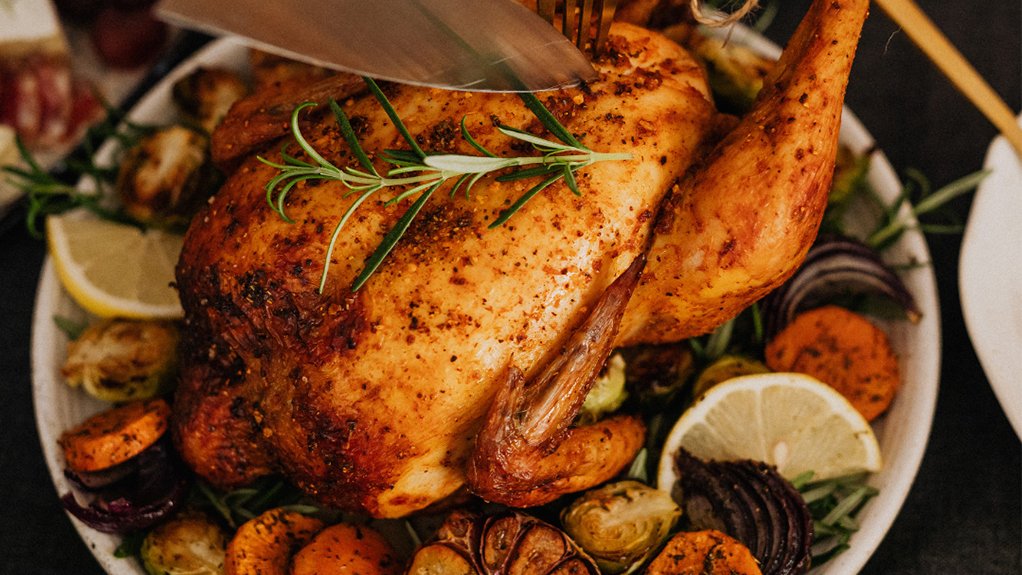Hume warns of high poultry prices ahead of festive season
South Africans are facing the possibility of a chickenless festive season this year owing to a perfect storm of supply shortages and rapid price hikes, says meat wholesaler Hume International.
MD Fred Hume cites data from the Pietermaritzburg Economic Justice and Dignity Group finding that the price of a 10 kg bag of frozen chicken rose by nearly 3%, or R11.33, in just 30 days – from R383.37 in July to R394.70 in August.
Hume expects this high price trend to increase further as local market pressures hit supply chains.
He attributes the runaway prices to three major causes, including non-tariff trade barriers that have blocked imports from major international suppliers; anti-dumping duties levied against South Africa’s most important poultry trading partners; and “underwhelming” supply from local producers that is being exacerbated by an ongoing bird flu epidemic.
“Unlike Namibia, South Africa has been dragging its feet in reopening poultry trade with certain countries such as Poland, Belgium and Argentina, even though these countries have been declared bird-flu-free.
“The fact that Ireland has the green light, as a far smaller producer than the other three countries, raises the concern that trade permissions may currently be guided by political motivations than phytosanitary concerns,” Hume states.
He adds that the South African government’s failure to reopen trade with these countries, even after they have been declared free of bird flu, serves as a significant non-tariff barrier to trade, further protecting local producers to the detriment of consumers, importers and local resellers.
Moreover, Hume says an anti-dumping duty of a maximum 265% for bone-in chicken imported from Brazil, in addition to an existing 62% import tariff, as well as anti-dumping duties on chicken imported from Ireland, Poland, Spain and Denmark, significantly disincentives imports, which have historically served to enhance competition and keep prices low for consumers, while augmenting supply in times of shortage.
Although these duties were originally intended to protect local producers and encourage job creation, these “duties and other anti-competitive regulations have alienated our most important trading partners” and have led to zero job creation, Hume says.
“In fact, we might see scores of workers being furloughed or retrenched or, in the best-case scenario, working less hours and receiving lower incomes.”
Notably, he says, few international poultry producers want to trade with South Africa while other markets offer them better prices and more beneficial trade terms.
“This means that we effectively have no Plan B in the event of, for example, a widespread bird flu epidemic decimating local supply,” Hume notes.
But topping off the powder keg, a new strain of bird flu called H7N6 has spread through Mpumalanga, Gauteng and the Free State over the past couple of months.
Alongside the more common H5N1 strain, this has led to the death of more than one-million chickens this year by the most conservative estimations, resulting in billions in lost revenue.
Coupled with unfavourable import tariffs, this will inevitably lead to price increases, lower supply availability and a drop in consumption of this protein, which is integral to the majority of South Africans.
“Worse still, the recent bird flu outbreak is hardly a black swan event. Bird flu is endemic in every poultry flock in the world, but under normal circumstances, imports would cushion the blow and keep prices in check. That is no longer the case.
“Next, the cost pressures facing local producers such as loadshedding and deteriorating water infrastructure are likely to be with us for some time to come,” he states.
Hume believes that, by forcing exclusive dependence on local producers, South Africa is inevitably passing these expenses onto already vulnerable consumers.
He says clients in the industry have reported that chicken prices from local suppliers have already jumped as much as 15% in the past two weeks in response to growing supply pressures.
“Additionally, given lengthy lead times for food supply chains, we are likely to only see the full impact of decreased imports and the pressures on local producers within the next two to three months,” he adds.
As such, Hume advocates for another temporary suspension of anti-dumping duties for a period of at least six months. During this time, the government should further reassess the appropriateness of the anti-dumping duties and include prominent importers in the conversation, he suggests.
Secondly, he says government must also urgently reopen trade with Poland and Belgium, and update its poultry quarantine regulations to better align with those of other countries.
Once countries have been declared free of bird flu by the relevant regulatory bodies, trade should be resumed promptly with these countries.
Hume highlights that delayed action to resolve the three major issues plaguing local poultry supply will result in a significant shortfall accompanied by a striking price increase on the inevitably limited stock.
“As things stand, South Africa is placing all of its eggs in one basket, based on the assumption that local producers will be able to quickly recover from the bird flu epidemic, meet local demand with little to no support from importers to plug the gap, and keep domestic prices from rising beyond what the average South African can afford.
“Ultimately, poultry imports play a critical role in maintaining market price competitiveness and supplementing local production shortages.
“Despite its reassurances, the local poultry sector simply does not have enough supply to meet growing demand, and this lack of international competition could result in a price catastrophe,” Hume states.
South African Poultry Association (SAPA) agrees that while demand is growing the industry has to contend with a few bird flu outbreaks, which may marginally inhibit supply, and that demand tends to grow substantially over the few months building up to Christmas, before tapering off again in January.
The association explains both the commercial layer and broiler sectors have been hard hit by the recent outbreaks, surpassing bird flu cases experienced in any year since the initial outbreaks in commercial poultry of 2017. Currently, the control measures for the disease involve the culling and safe disposal of infected livestock. This carries an enormous financial cost for the local poultry industry.
Many countries have started vaccination trials, with the hopes that vaccination will play an important role in controlling the disease. France, for example, has started vaccinating commercial flocks of ducks.
The domestic poultry industry is currently in discussion with the Department of Agriculture, Land Reform and Rural Development to explore the possible use of vaccines in its fight against the disease.
The use of vaccines against the H5 and H7 strains of bird flu will (as with many other avian diseases that the global poultry industry vaccinates for) add an important tool to the local industry’s biosecurity programmes aimed at managing and controlling the disease.
The enormous financial impact on producers through current disease control measure of culling is not sustainable, as South African producers are not receiving compensation from government, SAPA states.
Many producers in countries around the world receive governmental assistance in managing and controlling outbreaks, including financial compensation for their losses.
SAPA concludes South African producers are extremely concerned about the latest outbreaks. Should the trend continue around the speed with which the disease is spreading, this could lead to shortages in the supply chain.
Article Enquiry
Email Article
Save Article
Feedback
To advertise email advertising@creamermedia.co.za or click here
Press Office
Announcements
What's On
Subscribe to improve your user experience...
Option 1 (equivalent of R125 a month):
Receive a weekly copy of Creamer Media's Engineering News & Mining Weekly magazine
(print copy for those in South Africa and e-magazine for those outside of South Africa)
Receive daily email newsletters
Access to full search results
Access archive of magazine back copies
Access to Projects in Progress
Access to ONE Research Report of your choice in PDF format
Option 2 (equivalent of R375 a month):
All benefits from Option 1
PLUS
Access to Creamer Media's Research Channel Africa for ALL Research Reports, in PDF format, on various industrial and mining sectors
including Electricity; Water; Energy Transition; Hydrogen; Roads, Rail and Ports; Coal; Gold; Platinum; Battery Metals; etc.
Already a subscriber?
Forgotten your password?
Receive weekly copy of Creamer Media's Engineering News & Mining Weekly magazine (print copy for those in South Africa and e-magazine for those outside of South Africa)
➕
Recieve daily email newsletters
➕
Access to full search results
➕
Access archive of magazine back copies
➕
Access to Projects in Progress
➕
Access to ONE Research Report of your choice in PDF format
RESEARCH CHANNEL AFRICA
R4500 (equivalent of R375 a month)
SUBSCRIBEAll benefits from Option 1
➕
Access to Creamer Media's Research Channel Africa for ALL Research Reports on various industrial and mining sectors, in PDF format, including on:
Electricity
➕
Water
➕
Energy Transition
➕
Hydrogen
➕
Roads, Rail and Ports
➕
Coal
➕
Gold
➕
Platinum
➕
Battery Metals
➕
etc.
Receive all benefits from Option 1 or Option 2 delivered to numerous people at your company
➕
Multiple User names and Passwords for simultaneous log-ins
➕
Intranet integration access to all in your organisation




















